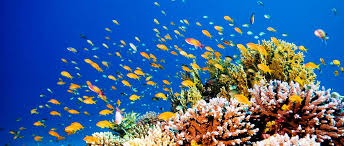Introduction to Escortfish
Coral reefs are often called the rainforests of the ocean, teeming with vibrant life and color. Yet, lurking among their stunning corals is a lesser-known hero: the escortfish. These small yet significant creatures play a vital role in maintaining coral health and supporting marine biodiversity. But what exactly makes escort fish indispensable to these delicate ecosystems? As we dive deeper into this fascinating subject, you’ll discover how escort fish contribute to thriving coral communities and why their protection is essential for our oceans’ future. Buckle up as we explore the underwater world where these fish reign supreme!
The Importance of Coral Health and Biodiversity
Coral reefs are often called the rainforests of the sea. They provide vibrant ecosystems teeming with life, and this unique biodiversity is crucial for maintaining balance in marine environments.
Healthy coral systems support countless species, from tiny fish to larger predators. Each organism plays a specific role, contributing to nutrient cycling and habitat stability. When one part suffers, the entire ecosystem can be affected.
Additionally, coral reefs protect coastlines from erosion and storm damage. They act as natural barriers against powerful waves, safeguarding coastal communities.
Beyond their ecological roles, these underwater gardens offer economic benefits, too. Fishing industries thrive around healthy reefs, while tourism relies on their beauty.
Coral health and biodiversity are interconnected, and the importance of preserving this delicate balance cannot be overstated. Preserving this balance is essential for sustaining marine life and human livelihoods.
How Escortfish Contribute to Coral Health
Escortfish play a vital role in maintaining the health of coral reefs. These small but significant fish are like guardians of their underwater homes.
They help control algae growth, which can easily overwhelm corals if left unchecked. By feeding on algae, escortfish facilitate a balanced ecosystem where corals can thrive.
Additionally, these fish have a symbiotic relationship with stony corals. Escortfish rely on the shelter provided by the coral structures while simultaneously attracting potential prey for other marine species.
This dynamic creates a more diverse and resilient reef community. Healthy corals, in turn, contribute to greater biodiversity overall.
Through their activities and interactions within this intricate web of life, escortfish contribute not just to individual coral health but also to the entire reef system’s stability and resilience against environmental changes.
Examples of Escortfish Species and their Role in Coral Ecosystems
Escortfish come in various species, each playing a unique role in coral ecosystems. One notable example is the **Clepticus parrae**, commonly known as the parrotfish. This vibrant creature not only grazes on algae but also helps maintain the balance within coral reefs.
Another important species is **Bodianus spp.**, often referred to as wrasse. These fish are crucial for cleaning parasites off larger reef inhabitants, promoting overall health among marine life.
Then there’s the **Thalassoma spp.**, or the stoplight parrotfish, which contributes by feeding on dead coral and, through waste products, providing essential nutrients back to its environment.
Each escort fish species interacts intricately with corals, enhancing biodiversity while ensuring that these fragile ecosystems thrive despite environmental challenges. Their presence signals a healthy reef community where many other marine organisms can flourish.
Threats to Escortfish Populations and Impact on Coral Reefs
Escortfish face numerous threats that jeopardize their populations and the health of coral reefs. Climate change is a significant factor leading to rising ocean temperatures and coral bleaching. As corals struggle to survive, escort fish lose their crucial habitat.
Pollution also poses a serious risk. Runoff from agricultural activities introduces harmful chemicals into marine environments. This contamination can disrupt the delicate balance within coral ecosystems, diminishing the availability of food for sportfish.
Overfishing directly impacts these small fish as well. Unsustainable fishing practices not only reduce their numbers but also affect predator-prey dynamics in reef systems. When escort fish are removed from the equation, an imbalance that further stresses already vulnerable corals is created.
Habitat destruction due to coastal development and tourism adds another layer of vulnerability. As natural habitats disappear, so too does the shelter necessary for escort fish to thrive among corals.
Conservation Efforts for Escortfish and Coral Reefs
Conservation efforts for sportfish and coral reefs are becoming increasingly vital as environmental challenges escalate. Organizations worldwide are focusing on habitat restoration, ensuring these fish have safe environments in which to thrive.
Marine protected areas (MPAs) play a crucial role in safeguarding both escortfish populations and their coral habitats. These zones limit human activities that can harm delicate ecosystems, allowing the natural balance to recover.
Education programs aimed at local communities help raise awareness about the importance of sportfish. When people understand how these species contribute to reef health, they become more invested in conservation initiatives.
Research is also key. Scientists are studying escort fish behavior and ecology, providing insights necessary for effective management strategies. This knowledge aids policy-makers in creating regulations that protect fish and corals from overfishing and habitat destruction.
Collaboration among governments, NGOs, and researchers fosters a robust network dedicated to preserving marine biodiversity.
The Relationship Between Coral Health and Biodiversity
Coral reefs are vibrant ecosystems teeming with life. Their health directly correlates to their biodiversity. Healthy corals provide essential habitats for a multitude of marine species, creating a complex web of interactions.
When coral thrives, it supports a variety of fish, invertebrates, and other organisms that rely on these structures for shelter and food. Each species plays its part in maintaining ecological balance.
In contrast, degraded coral systems lead to diminished biodiversity. The loss of one species can trigger further decline across the ecosystem. This cascading effect demonstrates how integral each organism is to overall reef vitality.
Moreover, diverse marine communities enhance resilience against environmental changes. A rich tapestry of life helps coral reefs withstand stressors like climate change and pollution better than monocultures do.
Understanding this relationship underscores the importance of preserving both coral health and biodiversity for future generations.
How Escortfish Help Maintain Coral Health
Through their unique behaviors, escortfish play a crucial role in maintaining coral health. These small, colorful fish often form symbiotic relationships with various coral species. By residing within the nooks and crannies of corals, they protect from predators.
In return, escort fish benefit from corals’ shelter and food resources. This mutual relationship fosters a balanced ecosystem where both parties thrive.
Additionally, escortfish help control algae growth on coral surfaces. Algae can smother corals if left unchecked, leading to detrimental effects on the reef’s overall health. Escortfish actively graze on these algal blooms, keeping them at bay.
Moreover, their presence attracts other marine life to the reef environment. This increased biodiversity enhances resilience against environmental changes and stresses like climate change or pollution.
By supporting coral structures and promoting ecological balance, sportfish are indispensable allies in preserving vibrant underwater ecosystems.
Case Studies of Successful Coral Ecosystems with Escortfish Populations
Research on the Great Barrier Reef has highlighted how escort fish enhance coral resilience. In areas with thriving escort fish populations, coral species showed increased growth rates and better resistance to bleaching events.
Another notable case is found in the Caribbean. Here, regions where escort fish are abundant demonstrate a more diverse array of marine life. The mutualistic relationships formed between these fish and corals play a significant role in nutrient cycling.
Additionally, studies from Fiji illustrate that healthy escort fish communities help maintain cleaner reefs by reducing algae levels. This creates an optimal environment for corals to flourish.
These ecosystems reveal just how essential escort fish are for promoting ecological balance within coral habitats and supporting biodiversity overall. Each case underscores their integral part in fostering vibrant marine environments.
Threats to Escortfish and Coral Reefs
Escortfish face numerous threats that jeopardize their survival and, consequently, the health of coral reefs. Overfishing is a significant concern. As these fish are often caught for aquariums or as bycatch in commercial fisheries, their populations dwindle.
Pollution poses another serious challenge. Runoff from agricultural practices introduces harmful chemicals into marine environments. These toxins can disrupt the delicate balance required for escortfish to thrive.
Climate change exacerbates problems further. Rising sea temperatures lead to coral bleaching, reducing shelter and food sources for many fish species. Without healthy corals, escort fish struggle to survive.
Habitat destruction also plays a critical role in declining numbers. Coastal development and destructive fishing practices destroy vital ecosystems where escort fish reside.
Each threat interlinks with others, creating a web of challenges that makes preserving both escort fish and coral reefs increasingly difficult.
Efforts to Protect Escortfish and Preserve Coral Biodiversity
Protecting escort fish is crucial for maintaining vibrant coral reefs. Various organizations are working tirelessly to safeguard these essential species through habitat restoration initiatives.
Marine protected areas (MPAs) play a significant role in this effort. By restricting fishing and other harmful activities, MPAs create safe havens where escort fish can thrive alongside corals. These zones encourage natural populations to recover and flourish.
Education also proves vital. Raising awareness among local communities about the importance of escorting fish helps foster stewardship of marine environments. Workshops, school programs, and community events serve as platforms for sharing knowledge about sustainable practices.
Research initiatives further enhance conservation strategies by identifying critical habitats for escort fish populations. Understanding their behaviors and life cycles enables scientists to develop targeted protection measures that support fish and coral health.
Collaboration between governments, NGOs, and researchers paves the way toward stronger protections—ensuring a resilient future for our oceans’ delicate ecosystems.
Conclusion: The Importance of Escortfish for a Healthy Marine Ecosystem
The role of sportfish in coral health and biodiversity cannot be overstated. These fascinating creatures serve as crucial allies for corals, promoting resilience and stability within marine ecosystems. By providing protection from predators and enhancing nutrient cycling, escortfish contribute significantly to the overall well-being of coral reefs.
Their presence is often a sign of a thriving ecosystem. Healthy populations of sportfish indicate that the environment can support diverse marine life, while their decline serves as a warning signal for impending ecological issues. Protecting these fish not only benefits them but also safeguards entire coral reef systems.
Conservation efforts focused on both escort fish and their habitats are vital for maintaining the delicate balance within ocean ecosystems. As we work towards preserving these essential species, we ensure the survival of vibrant underwater worlds rich in diversity and beauty. The intricate relationships between escort fish, corals, and other marine organisms highlight how interconnected our oceans truly are—and why safeguarding each link in this chain is imperative for future generations.




